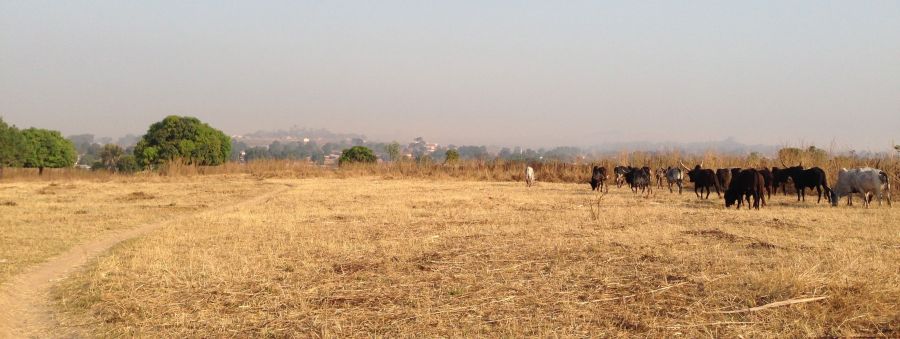 Lately I’ve been thinking a lot about danger, and our perceptions of danger. My ponderings began about a week ago, when the Peace Corps changed the classification of security in the East Adamawa region (chez moi) from Normal to Alert due to the crisis in the CAR and its effects across the border, here. Other areas (the East) have more serious security situations, and one post in the East (where the CAR was more or less in their backyard) may even be closing. The Internet says that the other week, ex-military refugees from the CAR abducted two UNHCR workers in Bertoua, the capital of Cameroon’s East Region, to draw attention to their plight, and then released them a few days later. This, coupled with the dramatic increase in refugees fleeing to Cameroon, seems to be the reason for our increased security classification.
Lately I’ve been thinking a lot about danger, and our perceptions of danger. My ponderings began about a week ago, when the Peace Corps changed the classification of security in the East Adamawa region (chez moi) from Normal to Alert due to the crisis in the CAR and its effects across the border, here. Other areas (the East) have more serious security situations, and one post in the East (where the CAR was more or less in their backyard) may even be closing. The Internet says that the other week, ex-military refugees from the CAR abducted two UNHCR workers in Bertoua, the capital of Cameroon’s East Region, to draw attention to their plight, and then released them a few days later. This, coupled with the dramatic increase in refugees fleeing to Cameroon, seems to be the reason for our increased security classification.
Closer to home, I can see the effects of the CAR crisis amongst the growing refugee population moving in with family members in Meiganga and the surrounding area. Refugees who are regular attendees at the hospital’s nutrition day (where I weigh babies on Thursdays) have been bringing new family members and friends in recent weeks. For the first time I’ve been in country, planes have been flying overhead at regular intervals, as the military flies from the base in Ngaoundéré to patrol the border. Moto drivers have been eager to speak of the large numbers of refugees they’ve seen coming across the border in Garoua-Boulai, the major border town that’s located about 90km away.
While there is some novelty in seeing my mom’s reaction when I tell her I live an hour and a half from a civil war, I actually feel perfectly safe in regards to this “security situation.” Most Cameroonians here are better informed on the CAR crisis than I am, and always have updates to share with me, as well as reassuring words that the conflict will not affect Cameroon. I am often told that the most important thing for Cameroonians is that they live in a peaceful nation<<3>>, and that as a result they will not allow any sort of conflict to spill over the border. It is curious to read news articles from the BBC or NY Times citing the “dangerous” and “real possibility” that the CAR conflict will spread to neighboring countries from a neighboring country where such a threat seems impossibly distant.
More mundane types of danger, however, can be found in Meiganga. Last week, on a bike ride to my friend’s neighboring village, three punk-ass twenty-something guys decided it would be fun to play Chase the White Girl On Her Bike, Grab At Her, And See What She Does. This White Girl, in a curious fight-or-flight decision, decided that braking hard to hit them with my bike and screaming at them would be the correct approach, and they subsequently ran away laughing. Nonetheless, I was left rather frazzled.
People chasing and/or grabbing at me tends to allow my imagination to spiral: Will this person try to steal all my things? Will they try to assault me? Will they try to kidnap me? AHHHH! I probably overreact to little things as a result, but I suppose it is better to be vigilant? What is frustrating for me is that in these situations, I’m not really being viewed as a person, but a strange White Thing who it’s fun to torment. Much like how some Cameroonian children find hitting dogs with sticks to see their reaction amusing, some adult Cameroonians (who should really know better) enjoy seeing what the White Thing will do if grabbed or threatened. These people are obviously a minority: most everyone I’ve encountered is very nice! But I suppose that assholes are universal, and can not be avoided. Meanwhile, the bike (aka harassment magnet) will be staying in for a bit until I’m feeling up for it again.
Another everyday type of danger relates to health. I currently am recovering from intestinal worms (sexy!), after a few not-so-fun days. After my malaria instant test came back negative, I headed off to the hospital, where lab tests confirmed the existence of the creepy-crawlies. Curiously, most everyone I’ve talked to on the subject have said “WELL, at least it isn’t malaria! That would be terrible!”. I would like to point out to the world, however, that they two maladies have very similar symptoms, with equally simple cures. Of course, both, left untreated/with complications, can also lead to death. I don’t want to trivialize the massive public health issue that malaria poses in subsaharan Africa. Simultaneously, I would like to assure all readers that Peace Corps volunteers get malaria all of the time, that I will probably get malaria while I am here, that I will have flu-like symptoms, and that I will be able to treat it and make it go away when the time comes. Do not fear: the danger that malaria, at least, poses to yours truly is quite small.
